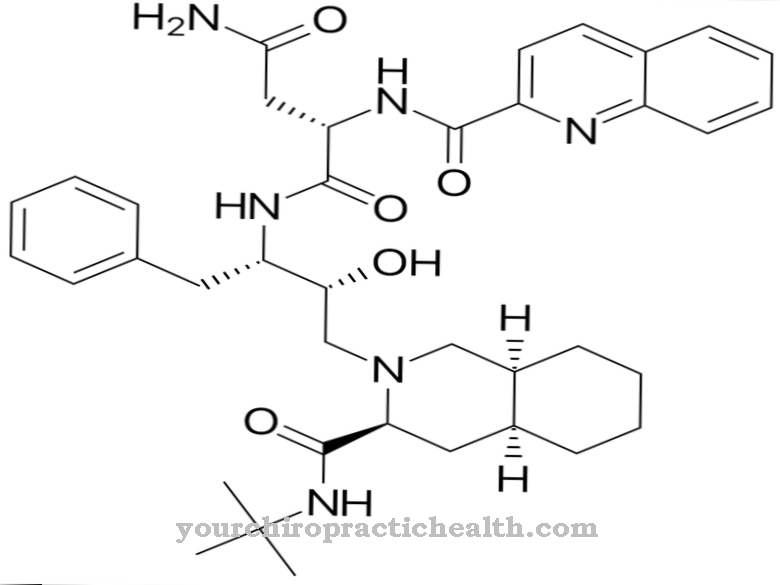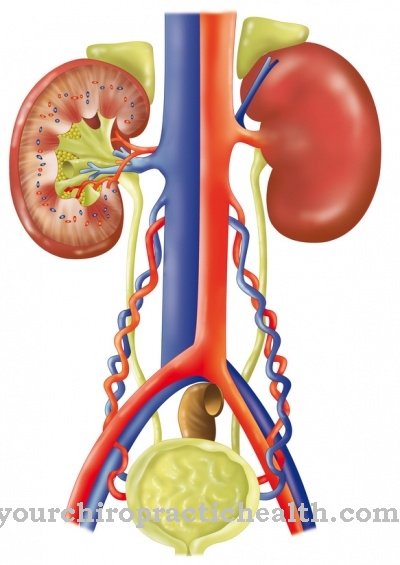With the preparation Afatinib it is a relatively new active ingredient used in the treatment of lung cancer. The anti-cancer effect is achieved by blocking the growth factors in the cells.
What is Afatinib?

The active ingredient afatinib is used to treat adult patients with advanced non-small cell lung cancer. It is a relatively new active ingredient that was only approved in the European Union and the USA in 2013 in the form of tablets.
These are taken once a day on an empty stomach and are intended on the one hand to prevent altered growth factors from being able to bind to altered receptors and on the other hand to prevent unhindered cell growth from being activated. Afatinib belongs to the group of kinase inhibitors.
Their healing effect is based on the fact that the active ingredients are bound to enzymes that play an important role in the development and spread of various types of cancer. Because kinase inhibitors are used specifically against different types of cancer such as lung cancer, breast or colon cancer, they are considered to be better tolerated than traditional cancer preparations.
Pharmacological effect
Like all other cells in the body, cancer cells are stimulated to multiply by various growth factors. To stimulate cell growth, the growth factor binds to the cell's receptor.
As a result, under the action of the enzyme tyrosine kinase, the receptor changes, whereupon the processes that are responsible for growth and reproduction are activated. The fact that tumor cells grow and multiply in an uncontrolled manner is due to the fact that their receptors for cell growth are either too large or too modified. The active ingredient Afatinib starts with this mechanism: It is deposited directly at the formation sites for the growth factors, whereby these are permanently and specifically blocked.
The preparation makes no distinction between natural or modified receptors. This prevents a cancer-promoting signal from being sent to the cells of the organism. At the molecular level, protein and lipid kinases are impaired in their function. Cancer cells can not only be hindered in growth by the preparation, but also destroyed. The preparation is therefore similar to other kinase inhibitors in terms of its mode of action. The effect of the drug lasts for a comparatively long time at 37 hours.
Medical application & use
Afatinib is only prescribed for adult patients with locally advanced lung cancer. The preparation is also effective if the cancer has already spread to other organs with metastases.
However, the prerequisite for treatment with afatinib is that the patient has activating EGFR mutations. A corresponding test is required before the active ingredient is administered for the first time. About 80 percent of all lung cancer patients can be treated with afatinib, as this percentage suffers from non-small cell lung cancer. Just like small-cell bronchial carcinomas, which are considered to be particularly aggressive, this form of lung cancer is symptom-free over long phases.
Typical symptoms such as chronic cough, breathing difficulties, coughing up blood, weight loss and a lack of appetite are usually only recognized as symptoms of lung cancer when it has reached an advanced stage in which a cure is no longer possible. The most important risk factors that can cause lung cancer are active and passive smoking.
Other substances such as radon, asbestos, radioactive dust and the like are also considered to be carcinogenic. Lung cancer outbreaks can also be favored by high levels of air pollution, pre-existing lung diseases and genetic predispositions.
Risks & side effects
Because treatment with afatinib can lead to side effects, some of which are serious, careful monitoring is necessary for the first six weeks after starting treatment. This is especially true when diarrhea occurs. These can be very serious and in extreme cases even lead to dehydration if the patient does not drink a lot of fluids to compensate.
The most common side effects also include severe skin reactions, which can get worse under the influence of ultraviolet radiation. Patients should protect themselves from the sun and not use a tanning bed. The side effects of afatinib can manifest themselves in a variety of complaints, so that further treatment must be carried out under special medical supervision.



























